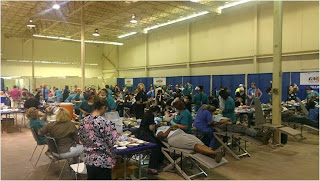By Fay Donohue, DentaQuest CEO & President
 At DentaQuest, we are a mission-driven organization. Everything we do, whether it is processing claims, recruiting dentists, developing plan options, funding grantees, or using scientific research, is directed at improving the oral health of all. To fulfill this mission it is important for us take time and ensure that our actions reflect how deeply committed we are to the people we serve and the places we live and work.
At DentaQuest, we are a mission-driven organization. Everything we do, whether it is processing claims, recruiting dentists, developing plan options, funding grantees, or using scientific research, is directed at improving the oral health of all. To fulfill this mission it is important for us take time and ensure that our actions reflect how deeply committed we are to the people we serve and the places we live and work.
This is why we are calling October “Mission Month” and dedicating the entire month to community service. Over 1,000 DentaQuest employees in Maryland, Florida, South Carolina, Texas, Wisconsin, and Massachusetts will dedicate thousands of hours to projects in their local communities. We expanded last year’s “Mission Day,” because it was so successful, our employees wanted to spend more time giving back.
I had the chance to kick-off our month-long effort at the Greater Boston Food Bank last week. My team and I inspected and sorted donated food items to be shipped to the 550 Greater Boston Food Bank member agencies. It was fun, incredibly rewarding, and most importantly, we helped feed those most in need.
Other service projects include volunteering at senior living centers, working with Habitat for Humanity, and maintenance work on nature preserves. Take a look at what’s going on all around the country.
I am proud to be part of an enterprise that is working each day to improve oral health and make a real difference in the lives and communities we serve.
 At DentaQuest, we are a mission-driven organization. Everything we do, whether it is processing claims, recruiting dentists, developing plan options, funding grantees, or using scientific research, is directed at improving the oral health of all. To fulfill this mission it is important for us take time and ensure that our actions reflect how deeply committed we are to the people we serve and the places we live and work.
At DentaQuest, we are a mission-driven organization. Everything we do, whether it is processing claims, recruiting dentists, developing plan options, funding grantees, or using scientific research, is directed at improving the oral health of all. To fulfill this mission it is important for us take time and ensure that our actions reflect how deeply committed we are to the people we serve and the places we live and work.This is why we are calling October “Mission Month” and dedicating the entire month to community service. Over 1,000 DentaQuest employees in Maryland, Florida, South Carolina, Texas, Wisconsin, and Massachusetts will dedicate thousands of hours to projects in their local communities. We expanded last year’s “Mission Day,” because it was so successful, our employees wanted to spend more time giving back.
I had the chance to kick-off our month-long effort at the Greater Boston Food Bank last week. My team and I inspected and sorted donated food items to be shipped to the 550 Greater Boston Food Bank member agencies. It was fun, incredibly rewarding, and most importantly, we helped feed those most in need.
Other service projects include volunteering at senior living centers, working with Habitat for Humanity, and maintenance work on nature preserves. Take a look at what’s going on all around the country.
I am proud to be part of an enterprise that is working each day to improve oral health and make a real difference in the lives and communities we serve.


.jpg)



